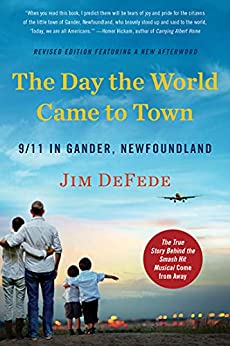More on this book
Community
Kindle Notes & Highlights
by
Jim DeFede
Read between
April 26 - April 28, 2024
“Newfoundlanders are a different breed of people,” Gander town constable Oz Fudge told me. “A Newfoundlander likes to put his arm around a person and say, ‘It’s going to be all right. I’m here. It’s going to be okay. We’re your friend. We’re your buddy. We’ve got you.’ That’s the way it’s always been. That’s the way it always will be. And that’s the way it was on September eleventh.”
Sandi Jones liked this
They placed their lives on hold for a group of strangers and asked for nothing in return. They affirmed the basic goodness of man at a time when it was easy to doubt such humanity still existed. If the terrorists had hoped their attacks would reveal the weaknesses in western society, the events in Gander proved its strength.
On September 11, however, Gander was in the midst of a nasty strike by the area’s school-bus drivers. Amazingly, as soon as the drivers realized what was happening, they laid down their picket signs, setting their own interests aside, and volunteered en masse to work around the clock carrying the passengers wherever they needed to go.
The selflessness of the townspeople gave Gray-Felder chills.
“We thought it was important to watch over you,” the pastor explained, “and make sure nothing happened to you while you slept.”
There was no hatred. No anger. No fear in Gander. Only the spirit of community. Here, everyone was equal, everyone was treated the same. Here, the basic humanity of man wasn’t just surviving but thriving. And Baldessarini understood that he was a witness to it and it was affecting him in ways he’d never imagined.
The Newfoundlanders had provided a caring haven for hundreds of people at a moment when they were scared and far from home. They were made to feel safe and secure when the world around them seemed anything but.
Brake remained stoic, almost detached, as he recounted the story of his life. He was glad the rabbi had sent for him, though. He had wanted someone like the rabbi to hear what he had to say so his story would not be lost when he died. Both Rabbi Sudak and Baila Hecht were moved by Brake’s words. They told him he should tell his story to more people. They encouraged him to visit schools, like the one they were in now, and to talk to the children about the Holocaust and about anti-Semitism. With so few Jews in Newfoundland, they argued, it was vital for him to come forward and provide a living
...more
And with his departure, Rabbi Sudak stopped wondering why he had he been brought to Newfoundland.
They did what they did for one reason only—it was the Newfie way.
It was Derm Flynn, the mayor of Appleton, Newfoundland. Flynn and Vitale had become friends during the trooper’s stay in Appleton. “Just thinking about you, buddy,” Flynn said. “How’s she going?” Flynn’s voice brought back all the good memories Vitale had about the people in Newfoundland. Their kindness, their strength, their support. He could feel his hands shaking.
“It made me realize that people are innately good.”
“That has never left me, the feeling of love by perfect strangers that looked after us. You know, I never experienced anything like that in my life.”
In Gander, we are reminded, people get divorced, friendships end, and families struggle with unemployment, alcoholism, and drug abuse. In other words, life is not a musical. And to treat Gander that way creates an unattainable ideal. Nevertheless, given all those human frailties, what happened in Gander is still remarkable. And perhaps the lesson isn’t that these acts of kindness occurred because Gander is a magical place, but rather that these people came together in a time of crisis regardless of their own personal shortcomings. And if that’s the case, then it offers hope that all of us have
...more


